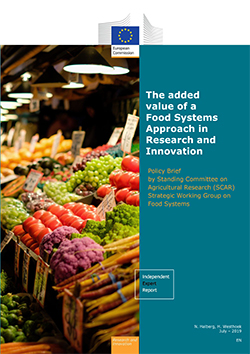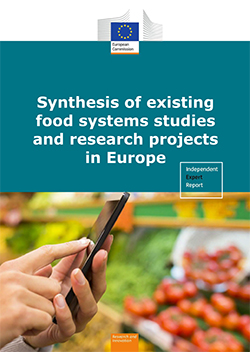

Thom Achterbosch
(Wageningen Economic Research, NL & coordinator H2020 project SUSFANS)
Arthur Getz Escudero
(private consultant, UK/ES)
With members of SCAR SWG Food Task Force
To be delivered: June 2018
MOTIVATION
There is a bright future for food and for farming in Europe, poses a memo from the European Commission to the AGRIFISH Council of February 2018, if in the EU we manage to “better link what we know to what we grow”. Thinking of future food security as a systems challenge is helpful in this regard. The FOOD 2030 initiative boasts the food systems approach to research & innovation (R&I) as one that contributes to "address the long term systemic challenges to our food and nutrition systems, to secure jobs and growth in this EU sector, and make good use of new scientific and investment opportunities”, and ultimately to deliver on the UN SDGs. What is known on food systems can be more sufficiently linked to research programming and research policy, allowing impact on what and how we grow, fish, process and retail food to consumers.
KNOWLEDGE GAP
What value added of a food systems approach can be demonstrated from examples in the published and grey literature?(1) There is a plethora of research initiatives and innovation actions that have addressed the links between food production and consumption at different scale of governance and granularity (global, nations, landscapes, cities, communities, etc.). How each of these initiatives and actions have given shape to a food systems approach to R&I in the EU differs widely.
OBJECTIVE
The objective of this paper is to provide a state-of the -art synthesis of relevant existing studies and research projects using a food systems approach to study Europe’s food system (as a whole) or geographical parts (countries, regions, cities) and certain aspects (for example nutrition, or environmental issues) as input to formulation of knowledge needs for EC research programs.
APPROACH
The following approach is taken:
Box 1. Food systems describe the linked processes in the production and use of food, as relations between (see figure):
 ((Based on UNEP 2016; Global Panel, 2016; HLPE, 2017))
((Based on UNEP 2016; Global Panel, 2016; HLPE, 2017))
Table 1. Preliminary list of food systems R&I actions to be studied.

QUESTIONS
1. What systems challenges related to the food system should be studied in your view?
2. Which publications (academic literature, grey literature) from food systems R&I actions and/or ongoing projects researching food systems could you suggest we include in our selection, perhaps particularly from your member states and at subnational level?
 |
The added value of a Food Systems Approach in Research and Innovation Policy Brief by Standing Committee on Agricultural Research (SCAR) |
|
 |
Synthesis of existing food systems studies and research projects in Europe |